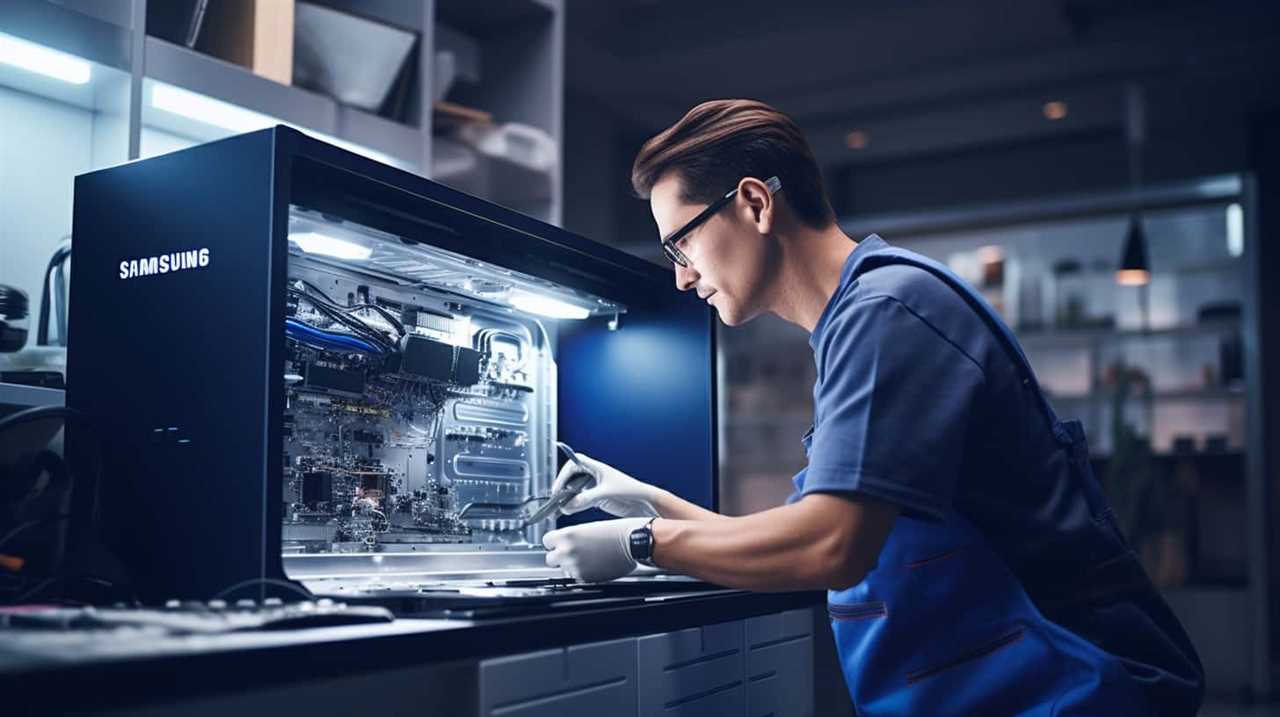Welcome to our informative article on smart home appliances! In this article, we will delve into the intriguing world of these innovative devices that improve our everyday activities.
From intelligent thermostats to connected kitchen appliances, these cutting-edge gadgets are revolutionizing the way we interact with our homes.
Join us as we delve into the key features, connectivity options, and future trends of smart home appliances.
Get ready to embark on a journey towards mastery of this exciting technology!

Key Takeaways
- Smart home appliances are devices that can be controlled and monitored remotely through a network connection, making homes more intelligent.
- These appliances have advanced features such as sensors and automation capabilities, allowing them to adjust settings based on user preferences and provide real-time alerts and notifications.
- The connectivity and integration with the Internet of Things (IoT) allow for automated tasks and remote monitoring, enhancing convenience and efficiency.
- Smart appliances offer various benefits such as energy consumption optimization, cost savings on utility bills, efficient operation, and improved home security features.
Definition of Smart Home Appliances
Smart home appliances are devices that can be controlled and monitored remotely through a network connection. These appliances have revolutionized our daily lives, transforming our homes into intelligent living spaces.
The evolution of smart appliances has brought about a significant impact on our daily routines. With the ability to connect and communicate with other devices, these appliances provide convenience, efficiency, and enhanced functionality. They can automate tasks such as adjusting the thermostat, turning on lights, or even brewing coffee, making our lives easier and more comfortable.
The impact of smart appliances on daily life is undeniable, as they streamline household chores, save energy, and improve overall productivity. As we explore the evolution of home appliances, it becomes evident that smart technology has transformed our homes into efficient and interconnected environments.
Evolution of Home Appliances
As we examine the evolution of home appliances, we witness a gradual shift towards integrating advanced technology into our everyday lives. The evolutionary advancements in home appliances have had a significant impact on daily life, making tasks more convenient and efficient.

Here are three key ways in which these advancements have transformed our homes:
- Automation: Smart home appliances now have the ability to automate various tasks, such as controlling the temperature, turning lights on and off, and even starting the coffee maker in the morning.
- Connectivity: With the rise of the Internet of Things, home appliances can now be connected to our smartphones and other devices, allowing us to monitor and control them remotely.
- Energy efficiency: Modern home appliances are designed to be more energy-efficient, helping us reduce our carbon footprint and save money on utility bills.
These evolutionary advancements have revolutionized the way we interact with our homes, making them smarter and more efficient than ever before.
Key Features of Smart Appliances
How do smart appliances enhance our everyday lives?
Smart appliances come with a range of key features that offer numerous benefits and advantages.

One of the key features of smart appliances is their connectivity. They can be connected to a home network, allowing users to control and monitor them remotely using a smartphone or other smart devices.
This enables users to conveniently manage their appliances even when they aren’t at home.
Smart appliances also have advanced sensors and automation capabilities, allowing them to adjust settings based on user preferences or to optimize energy usage.
In addition, smart appliances can provide real-time alerts and notifications, ensuring that users stay informed about any issues or changes.

These key features provide convenience, efficiency, and peace of mind, making smart appliances an excellent addition to any modern home.
Connectivity and Internet of Things (IoT)
With its connectivity capabilities, smart appliances enhance our everyday lives by seamlessly integrating into our home network and allowing us to control and monitor them remotely. The Internet of Things (IoT) enables these appliances to communicate with each other and with us, creating a more convenient and efficient living environment.
Here are three ways in which connectivity and IoT enhance our smart home experience:
- Automated tasks: Smart appliances can be programmed to perform tasks automatically, such as adjusting the thermostat based on our preferences or starting the washing machine at a specific time.
- Remote monitoring: We can monitor the status of our appliances from anywhere, ensuring peace of mind and allowing us to address any issues promptly.
- Energy efficiency: Connectivity enables our appliances to communicate and coordinate with each other, optimizing energy usage and reducing waste.
While connectivity brings numerous benefits, it also presents challenges, such as ensuring secure and reliable connections, and addressing privacy concerns.

Examples of Smart Home Appliances
Let’s take a look at some examples of popular smart home appliances.
These devices, such as smart thermostats, smart refrigerators, and smart security systems, offer a range of benefits.
With features like remote control, energy efficiency, and automation, smart appliances provide convenience and savings.
Additionally, many of these appliances can be integrated with voice assistants for voice-controlled operation.

Popular Smart Home Appliances
We have identified several popular smart home appliances that exemplify the convenience and automation that smart technology can bring to our daily lives. These appliances have gained popularity due to the increasing consumer demand for smart home solutions.
Here are three examples of popular smart home appliances:
- Smart Thermostats: Brands like Nest and Ecobee offer smart thermostats that can be controlled remotely via smartphone apps. They learn your preferred temperature settings and can adjust accordingly, saving energy and money.
- Smart Locks: Companies like August and Schlage have introduced smart locks that can be controlled through your smartphone. You can lock and unlock your doors remotely, provide temporary access to guests, and receive notifications when someone enters or leaves your home.
- Smart Lighting: Philips Hue and LIFX offer smart lighting solutions that can be controlled through voice commands or smartphone apps. You can adjust the brightness, color, and schedule of your lights, creating personalized lighting scenes for different moods or activities.
These popular brands have capitalized on the growing consumer demand for convenience and automation in our homes.
Benefits of Smart Appliances
One of the benefits of smart appliances is the ability to control them remotely. With smart home appliances, you can conveniently monitor and manage your devices even when you aren’t at home. This remote control feature allows you to adjust settings, turn appliances on and off, and receive real-time updates through your smartphone or tablet.

This not only provides convenience but also helps in optimizing energy consumption. You can remotely monitor and manage your energy usage, ensuring that appliances aren’t left running when they aren’t needed, thus saving energy and reducing utility bills. Furthermore, remote monitoring allows you to identify and address any potential issues with your appliances, ensuring their efficient operation.
Overall, smart appliances offer the convenience of remote control and monitoring while promoting energy efficiency and cost savings.
With the benefits of remote control and energy monitoring, smart appliances seamlessly integrate with voice assistants.
Integration With Voice Assistants
Smart appliances seamlessly integrate with voice assistants, enhancing the convenience and control of your smart home. Here are three examples of how smart home appliances can be integrated with voice assistants:

- Voice-controlled thermostats: You can easily adjust the temperature in your home by simply speaking to your voice assistant. Say goodbye to manually adjusting the thermostat and hello to effortless comfort.
- Voice-activated smart lights: With voice assistant compatibility, you can control the lighting in your home with just your voice. Turn on or off lights, dim them, or even change their colors, all without getting up from your couch.
- Voice-controlled kitchen appliances: Imagine cooking dinner while having your hands full. With voice assistant integration, you can ask your smart oven to preheat, set timers, or even adjust cooking settings, all without lifting a finger.
Benefits of Smart Appliances
Smart appliances offer a range of benefits to homeowners.
Firstly, they provide energy efficiency advantages by optimizing energy usage and reducing utility bills.
Secondly, they offer convenience and automation benefits, allowing users to control and monitor their appliances remotely.
Lastly, smart appliances often come with improved home security features, providing an added layer of protection and peace of mind.
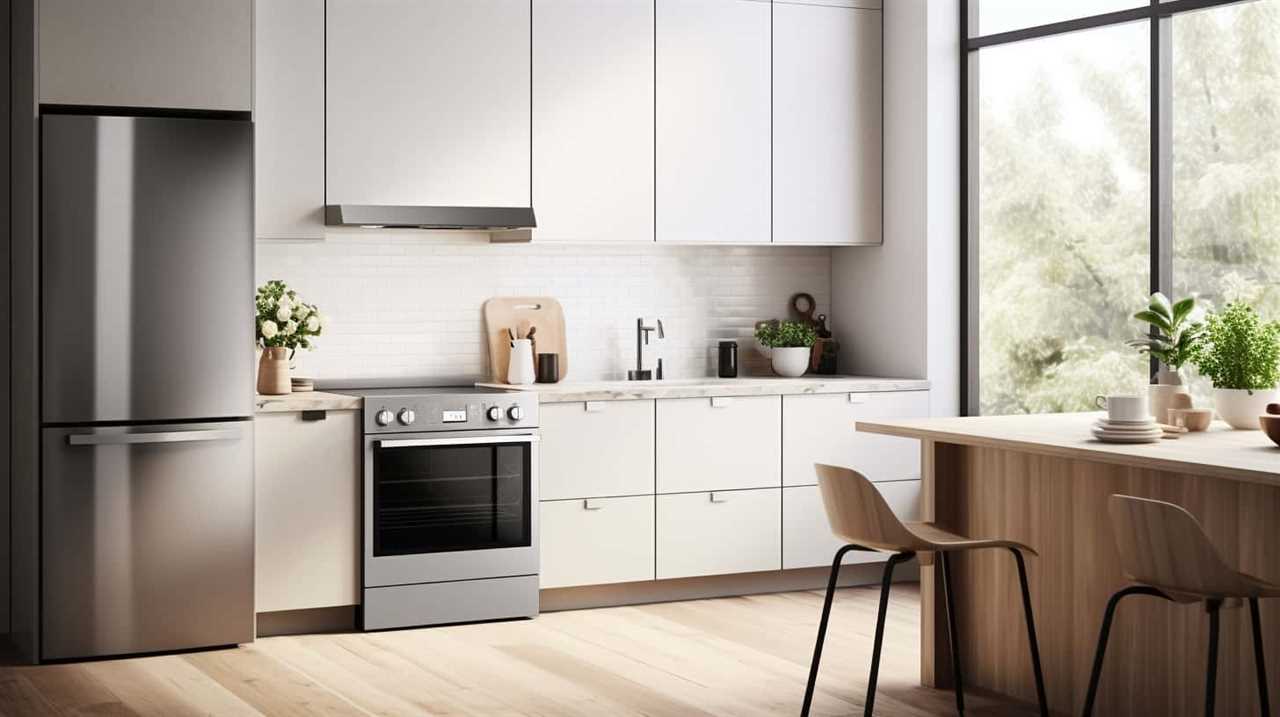
Energy Efficiency Advantages
We love how energy-efficient smart appliances can help us save money and reduce our environmental impact. Here are three key advantages of energy efficiency in smart appliances:
- Energy monitoring capabilities: Smart appliances allow us to track and monitor our energy usage in real-time. With this information, we can identify energy-hungry appliances and make adjustments to reduce consumption.
- Environmental impact assessment: By providing data on energy consumption, smart appliances enable us to assess their environmental impact. This information empowers us to make more sustainable choices and reduce our carbon footprint.
- Cost savings: Energy-efficient smart appliances can significantly lower our utility bills. They’re designed to minimize energy waste, leading to lower energy consumption and, consequently, reduced costs.
By harnessing the power of energy efficiency, smart appliances not only benefit our wallets but also contribute to a greener and more sustainable future.
Now, let’s explore the convenience and automation benefits of these remarkable devices.
Convenience and Automation Benefits
With their ability to automate tasks and provide added convenience, smart appliances revolutionize the way we interact with our homes. These appliances are equipped with advanced technology integration, allowing them to be controlled remotely through smartphone apps or voice commands. They can perform tasks such as preheating the oven or starting the washing machine, even when we are not at home. This level of convenience saves us time and effort, making our lives easier and more efficient. Additionally, smart appliances come with energy-saving features, such as automatic shut-off and energy usage monitoring. This not only helps us reduce our carbon footprint but also saves us money on utility bills. Overall, the convenience and automation benefits of smart appliances enhance our daily lives and improve our home management experience.
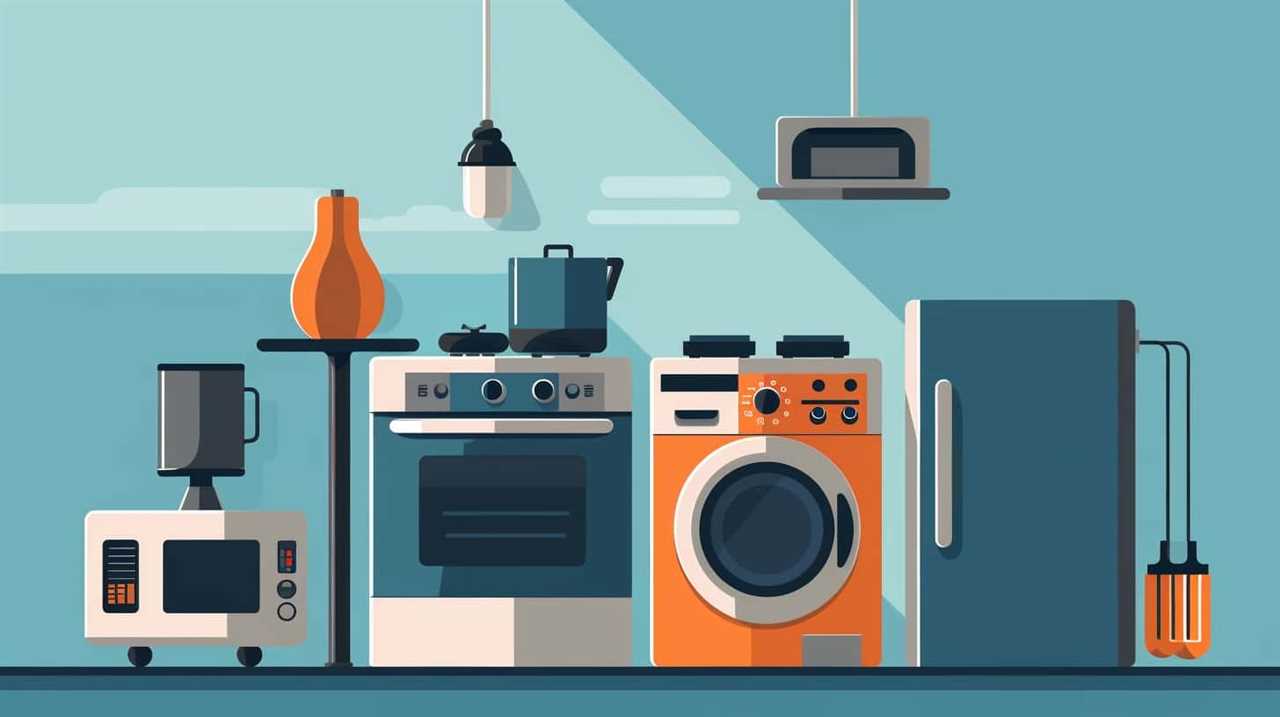
| Benefits of Smart Appliances | |
|---|---|
| Automation of tasks | Increased convenience |
| Remote control | Time-saving |
| Energy-saving features | Cost-effective |
| Advanced technology integration | Improved home management |
Improved Home Security Features
One notable benefit of smart appliances is the enhanced home security they provide through the integration of advanced security features. With the power of home automation, these appliances offer improved protection for your home.
Here are three ways smart appliances contribute to improved home security:
- Surveillance systems: Smart appliances can be connected to surveillance cameras, allowing you to monitor your home remotely. You can view live video feeds and receive notifications on your smartphone if any suspicious activity is detected.
- Smart locks: These appliances enable you to control and monitor your door locks remotely. You can lock and unlock your doors using your smartphone, and even create temporary access codes for guests.
- Motion sensors: Smart appliances can be equipped with motion sensors that detect any movement when you’re away. You’ll receive instant alerts if someone enters your home, helping you take immediate action.
Energy Efficiency and Cost Savings
The energy efficiency and cost savings of smart home appliances make them a practical choice for homeowners. Smart appliances are designed to optimize energy management and reduce environmental impact. These appliances use advanced technologies to monitor and regulate energy consumption, ensuring that only the necessary amount of energy is used.
Through features like programmable settings and remote access, homeowners have more control over their energy usage, allowing them to save money on their utility bills. Additionally, smart appliances can provide real-time data on energy consumption, enabling homeowners to make informed decisions about their energy usage habits. With the ability to efficiently manage energy and reduce costs, smart home appliances offer a sustainable and economical solution.

Transitioning into the next section, let’s explore how these appliances also enhance convenience and automation in the home.
Enhanced Convenience and Automation
Enhanced convenience and automation are key features of smart home appliances. These appliances offer time-saving features such as programmable settings and automated tasks, making daily routines more efficient.
Additionally, smart home appliances provide energy efficiency benefits by optimizing energy usage based on user preferences and real-time data.
With remote control capabilities, users can conveniently monitor and control their appliances from anywhere using their smartphones or other connected devices.

Time-Saving Features
With smart home appliances, we can enjoy enhanced convenience and automation, saving time in our daily lives. Here are three ways these appliances help us save time:
- Automated routines: Smart appliances allow us to create custom routines that automate repetitive tasks. For example, we can set our coffee maker to start brewing at a specific time every morning, ensuring a fresh cup of coffee is ready when we wake up.
- Remote control: Many smart appliances can be controlled remotely through smartphone apps. This means we can turn on the air conditioner or preheat the oven on our way home, saving time and ensuring a comfortable environment upon arrival.
- Energy-saving technology: Smart appliances often come equipped with energy-saving features. They can automatically adjust settings based on usage patterns or even detect when a room is empty to reduce energy consumption, saving both time and money.
Energy Efficiency Benefits
Our smart home appliances’ energy efficiency benefits enhance convenience and automation. By using energy-saving technologies, these appliances help reduce energy consumption, resulting in both cost savings and a positive environmental impact. With smart thermostats, for example, homeowners can easily control and schedule their heating and cooling systems, optimizing energy usage and reducing wastefulness. Smart lighting systems enable users to remotely control lights and set up automated schedules, ensuring lights are only on when needed. Additionally, smart appliances, such as refrigerators and washing machines, can automatically adjust their power usage based on the load and time of day, maximizing energy efficiency. Overall, the energy savings provided by smart home appliances not only enhance convenience but also contribute to a greener, more sustainable future.
| Energy Efficiency Benefits | Examples |
|---|---|
| Reduced energy consumption | Smart thermostats, smart lighting systems |
| Cost savings | Smart appliances, automated power usage adjustment |
| Positive environmental impact | Greener, more sustainable future |
Remote Control Capabilities
To continue our discussion on smart home appliances, let’s explore the remote control capabilities that enhance convenience and automation.
With voice control technology, controlling your smart appliances becomes effortless. Simply speaking commands to your virtual assistant, such as ‘turn on the lights’ or ‘adjust the thermostat,’ allows you to control various aspects of your home without lifting a finger. This not only saves time and effort but also adds a touch of luxury to your daily routine.

In addition to convenience, remote control capabilities can also help you manage your energy consumption more efficiently. By remotely controlling appliances like lights, thermostats, and smart plugs, you can easily turn off or adjust their settings when you’re away from home. This way, you can ensure that energy isn’t wasted on unnecessary usage, ultimately reducing your environmental impact and saving on energy bills.
With remote control capabilities, you have the power to make your home smarter and more energy-efficient.
Improved Home Security and Safety
We can enhance our home security and safety through the use of smart home appliances. With improved home automation and advanced surveillance systems, these appliances provide an added layer of protection for our homes.
Smart security cameras, for example, can be connected to our smartphones, allowing us to monitor our homes in real-time from anywhere. Additionally, smart locks offer convenient and secure access control, allowing us to remotely lock and unlock our doors. The integration of motion sensors and alarms further increases our home’s security by alerting us to any suspicious activities.

By utilizing these smart home appliances, we can have peace of mind knowing that our homes are well-protected.
In the next section, we’ll explore how smart home appliances integrate with voice assistants to provide even greater convenience and control.
Integration With Voice Assistants
How can smart home appliances integrate with voice assistants to provide even greater convenience and control?
Here are three ways in which voice control and virtual assistants enhance the functionality of smart home appliances:

- Hands-free operation:
With voice control, you can effortlessly command your appliances without having to physically interact with them. Whether it’s adjusting the thermostat, turning on the lights, or starting your coffee maker, simply speaking a command allows you to control your devices from anywhere in your home. - Seamless integration:
Voice assistants like Amazon Alexa or Google Assistant can connect with a wide range of smart home appliances. This means you can control multiple devices with a single voice command, creating a cohesive and streamlined smart home experience. - Customizable automation:
Virtual assistants enable you to create personalized routines and automation for your smart home appliances. By setting up specific voice commands or schedules, you can automate tasks and have your appliances respond to your needs without manual intervention.
With the integration of voice assistants, smart home appliances become even more convenient and responsive, adding a new level of control to your everyday life.
Compatibility and Smart Home Ecosystems
When it comes to smart home appliances, compatibility with other devices and ecosystems is a crucial aspect to consider. Integration with different devices allows for seamless control and automation, enabling users to create a unified and interconnected home ecosystem.
Ecosystem interoperability ensures that smart appliances from different manufacturers can work together, providing a more convenient and efficient experience for users.
Integration With Devices
Smart home appliances seamlessly connect and interact with various devices, enhancing the compatibility and integration within the smart home ecosystem. This integration is achieved through device compatibility and user interface design, allowing users to control and monitor their appliances from a central hub or through their smartphones.
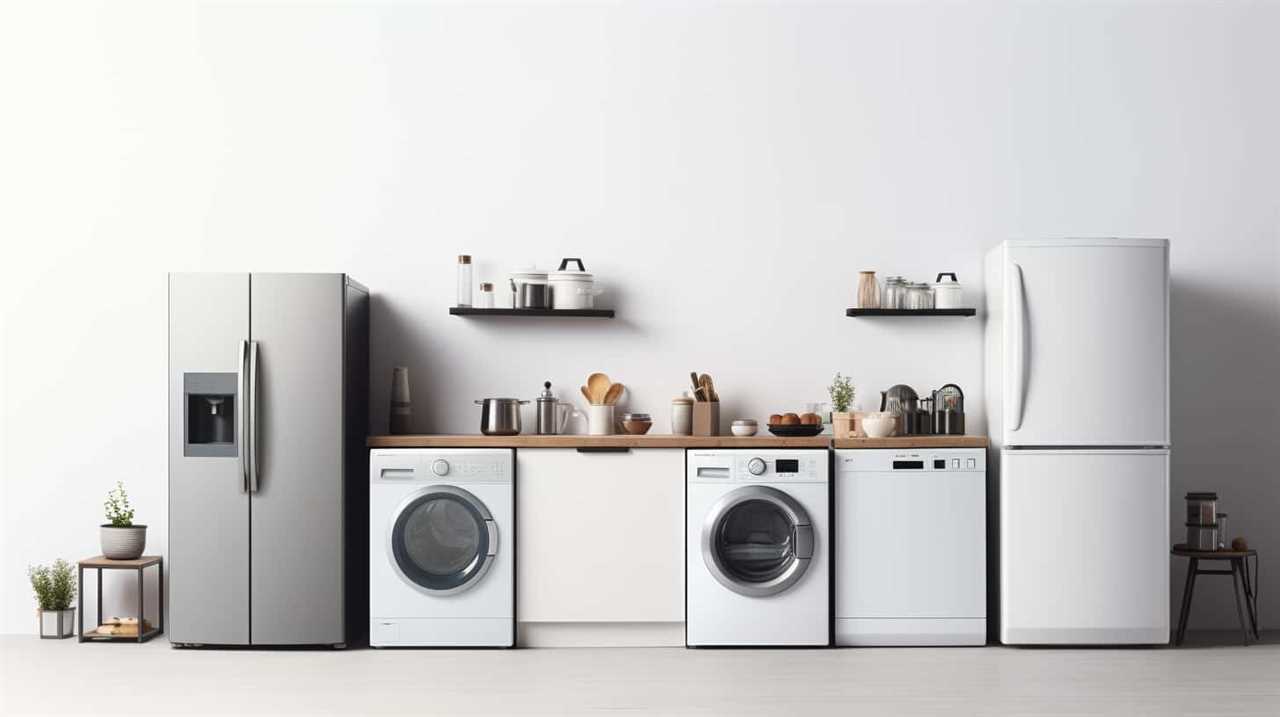
Here are three ways in which smart home appliances integrate with devices:
- Voice control: Smart home appliances can be connected to virtual assistants like Amazon Alexa or Google Assistant, enabling users to control them through voice commands.
- Smartphone integration: Users can control and monitor their appliances remotely through dedicated mobile applications, which provide real-time updates and allow for customization of settings.
- Interconnectivity: Smart home appliances can communicate with each other, creating a synchronized and automated environment. For example, a smart thermostat can adjust the temperature based on inputs from a smart door sensor or smart window blinds.
Through seamless integration with various devices, smart home appliances make it easier for users to manage their homes efficiently and conveniently.
Ecosystem Interoperability
To ensure compatibility and seamless integration within the smart home ecosystem, smart home appliances are designed to be interoperable with a wide range of devices. This interoperability allows different devices to communicate and work together, creating a cohesive and efficient smart home experience.
Ecosystem compatibility is crucial for users who want to connect and control multiple smart devices through a single interface or voice command. By adhering to industry standards and protocols, smart home appliances can interact with devices from different manufacturers, ensuring a smooth user experience.
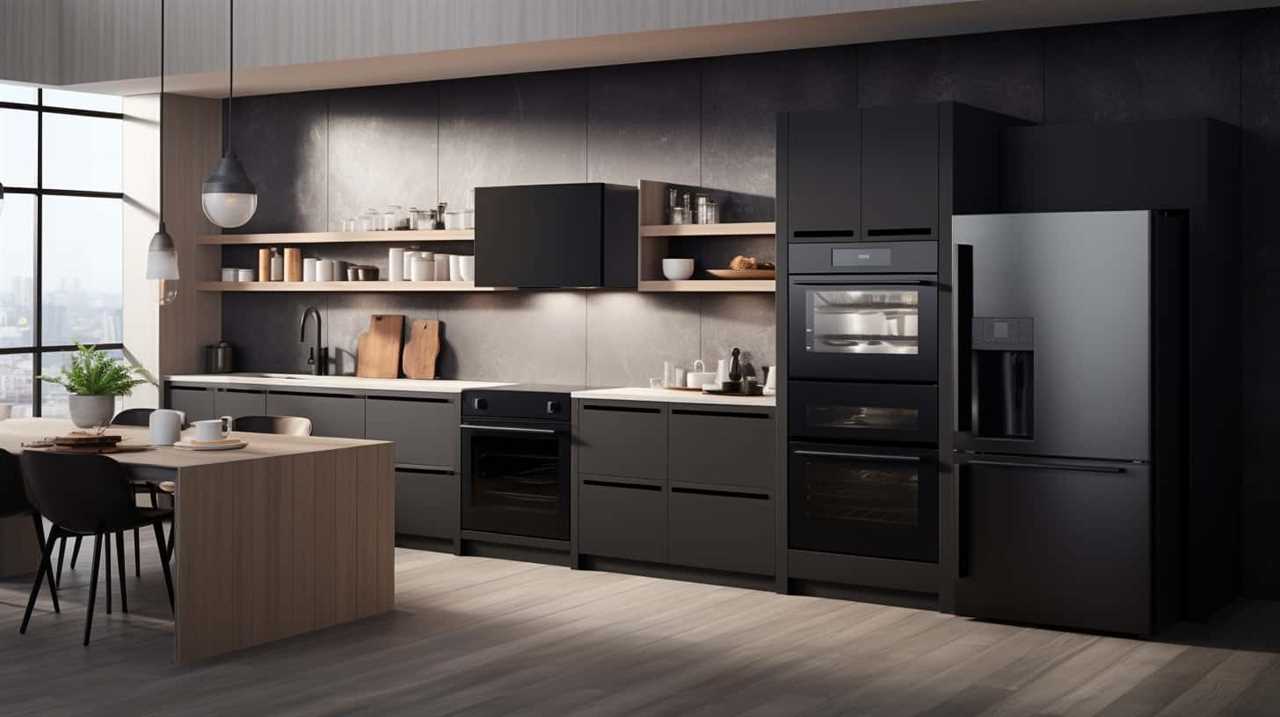
However, it’s important to consider data privacy when integrating devices into the smart home ecosystem. Users should choose appliances that prioritize data security and provide options for controlling and protecting personal information.
With these considerations in mind, let’s now move on to discuss the factors to consider when choosing smart appliances.
Considerations for Choosing Smart Appliances
One important factor to consider when choosing smart appliances is the energy efficiency rating. Smart appliances that are energy efficient can help reduce electricity consumption and lower utility bills.
Here are three additional considerations to keep in mind when selecting smart appliances:

- Connectivity: Check if the smart appliance is compatible with your home’s existing network or if it requires a separate hub. This ensures seamless integration and ease of use within your smart home ecosystem.
- Compatibility with Voice Assistants: Confirm if the smart appliance works with popular voice assistants like Amazon Alexa or Google Assistant. This allows for convenient voice control and hands-free operation.
- App Features: Explore the features and functionalities offered by the accompanying smartphone app. Look for features like remote control, scheduling, and energy usage monitoring, which can enhance the convenience and efficiency of your smart appliances.
Installation and Setup of Smart Appliances
When setting up smart appliances, we need to ensure a smooth installation process that integrates them seamlessly into our smart home ecosystem. The installation process typically involves connecting the appliances to our home Wi-Fi network and downloading the corresponding smart home app on our smartphones or tablets.
This app allows us to control and monitor the appliances remotely. During the setup, it’s important to follow the manufacturer’s instructions carefully and ensure that the appliances are placed within range of the Wi-Fi signal. Troubleshooting common issues, such as connectivity problems or firmware updates, may also be necessary.
By properly installing and setting up our smart appliances, we can fully enjoy the convenience and efficiency they bring to our everyday lives.
Looking ahead, let’s explore the future trends in smart home appliances.

Future Trends in Smart Home Appliances
As homeowners, we can expect exciting advancements and innovations in the future of smart home appliances. These future innovations will have a significant impact on our daily lives, making our homes more efficient, convenient, and secure.
Here are three trends to look out for:
- Integration of Artificial Intelligence (AI): Smart home appliances will become smarter by incorporating AI technology. They’ll be able to learn our preferences and habits, anticipate our needs, and make intelligent decisions to optimize energy usage and improve our overall comfort.
- Enhanced Connectivity: Future smart home appliances will offer seamless integration with other devices and platforms. They’ll be able to communicate and share data with each other, allowing for a truly connected and automated home ecosystem.
- Sustainability and Energy Efficiency: With an increasing focus on environmental sustainability, future smart home appliances will prioritize energy efficiency. They’ll be designed to minimize energy consumption, reduce waste, and contribute to a greener and more sustainable lifestyle.
These advancements in smart home appliances will undoubtedly transform the way we live, making our homes more intelligent, convenient, and environmentally friendly.
Frequently Asked Questions
Are Smart Home Appliances Only Controlled Through Voice Commands?
Smart home appliances can be controlled through alternative methods like smartphone apps and smart hubs. Beyond voice commands, they offer benefits such as energy efficiency, convenience, and enhanced security.
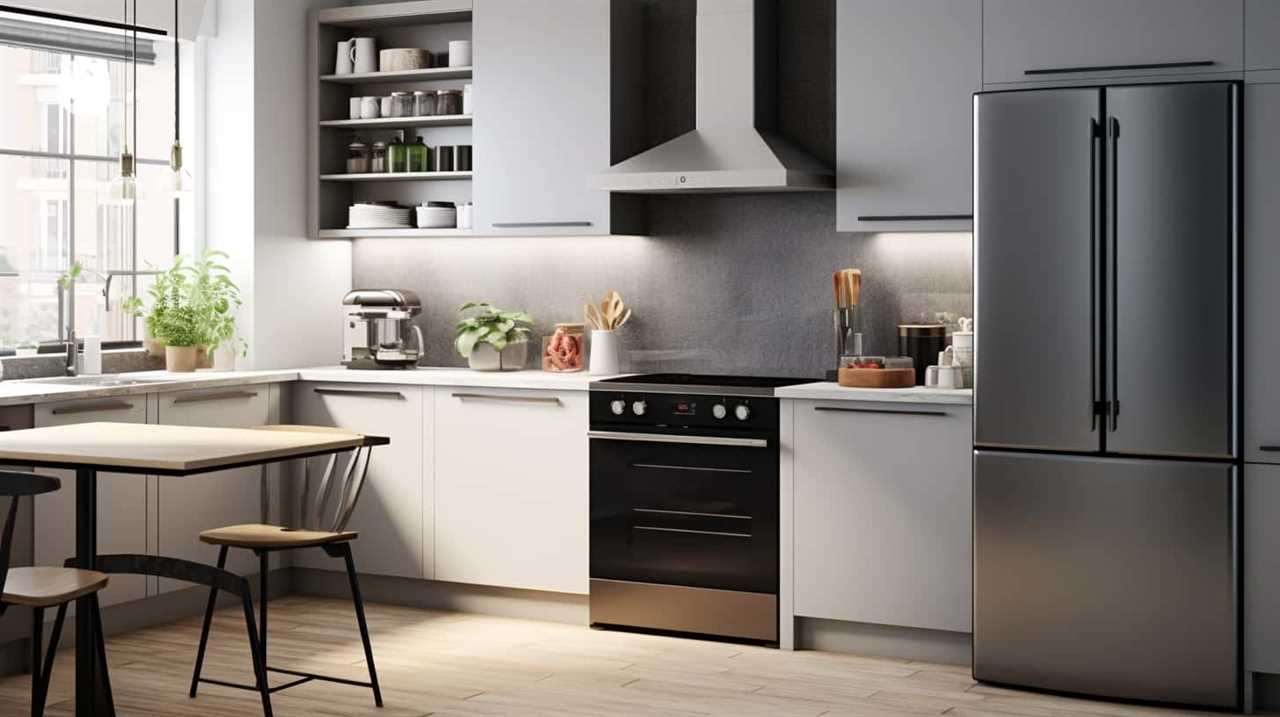
Can Smart Home Appliances Be Integrated With Existing Home Security Systems?
Integrating smart home appliances with traditional security systems is possible, but there may be potential challenges. It’s important to ensure compatibility between devices and consider any necessary adjustments to the existing security system.
How Do Smart Home Appliances Contribute to Energy Efficiency?
Smart home appliances contribute to energy efficiency by incorporating energy-saving features. They help reduce electricity consumption through features like smart thermostats, energy-efficient lighting, and automatic shut-off functions.
Do Smart Home Appliances Require a Stable Internet Connection to Function?
Yes, smart home appliances require a stable internet connection to function. This is because they rely on internet connectivity for communication and remote control. Compatibility with smart home systems is important for seamless integration.
What Are Some Potential Future Advancements in Smart Home Appliances?
In the future, smart home appliances could see exciting advancements. We may witness the integration of artificial intelligence, enabling appliances to adapt and learn. Gesture control may also become more prevalent, offering a new level of convenience and interactivity.

Conclusion
In conclusion, smart home appliances are the future of convenience and efficiency. With their advanced features and connectivity, they’ve evolved from traditional appliances to intelligent devices that can be controlled remotely.
From refrigerators to thermostats, these appliances are designed to make our lives easier and more connected.
As technology continues to advance, the future of smart home appliances looks promising, with even more innovative and interconnected solutions on the horizon.





